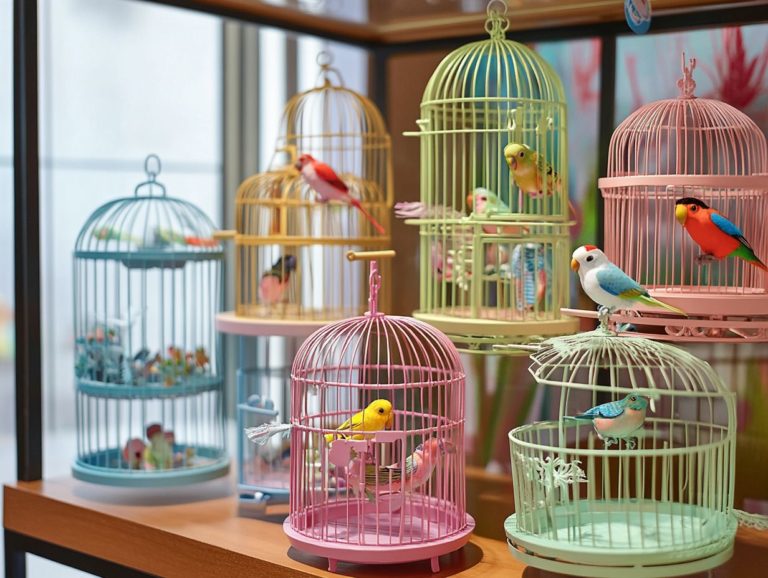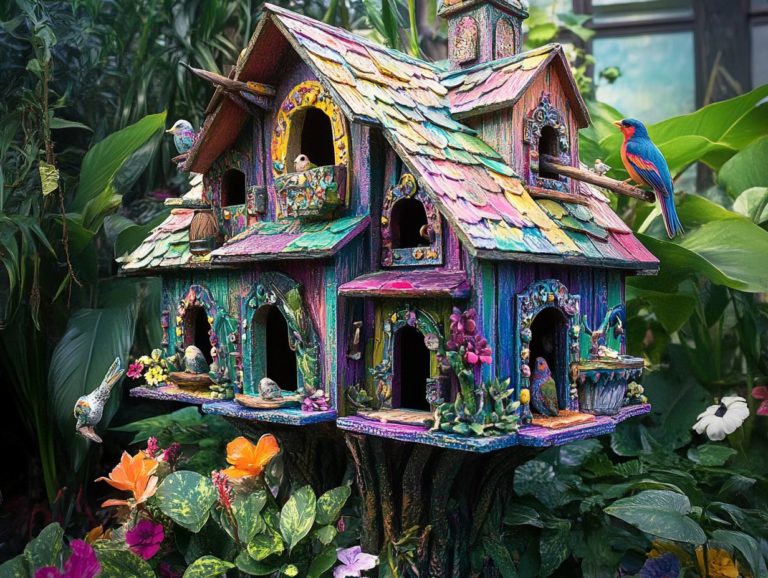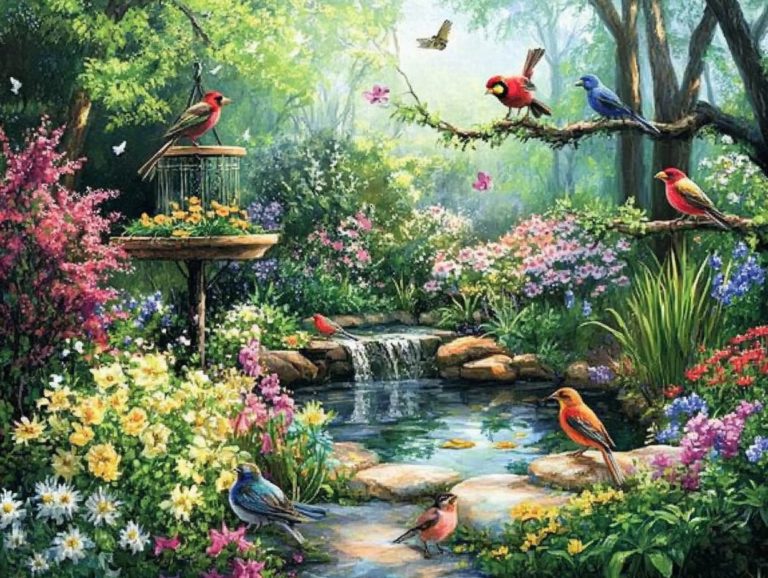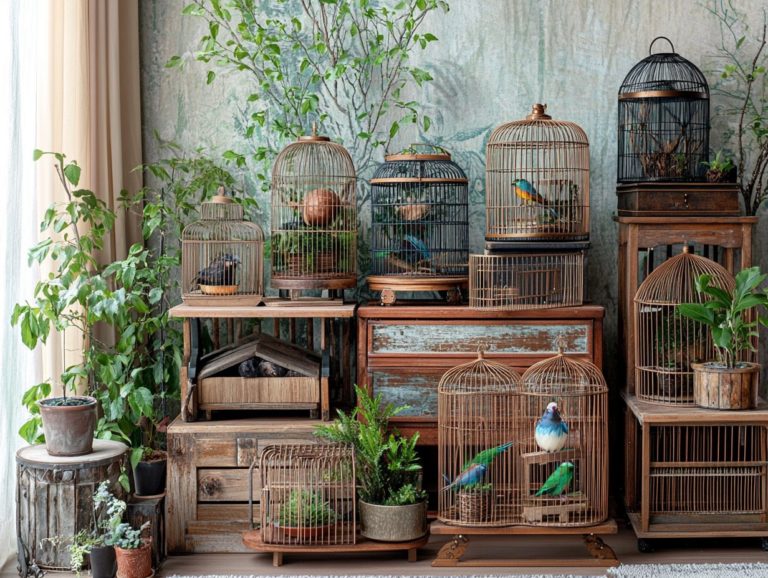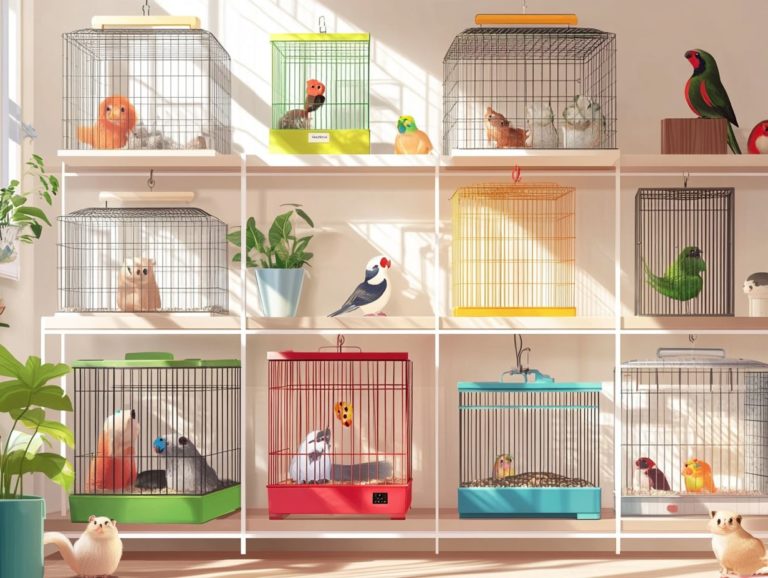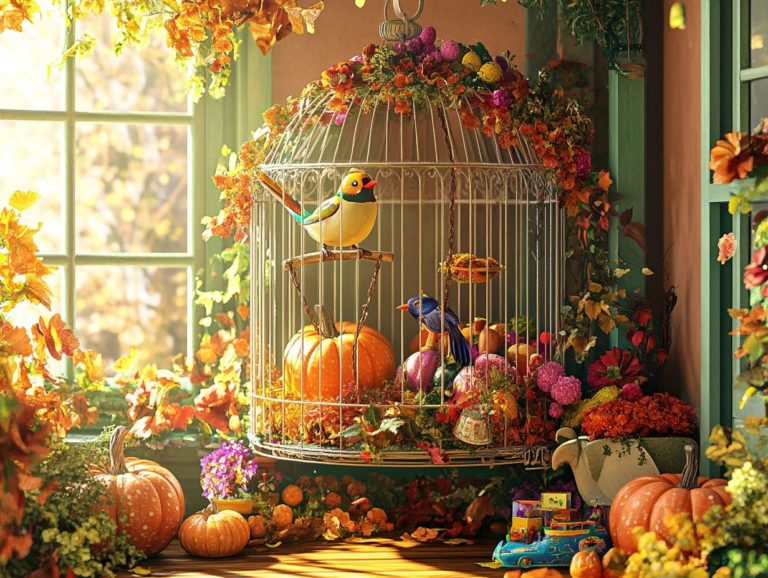How to Keep Birds Safe from Household Hazards
Birds bring immense joy and companionship into your life. However, they are delicate creatures that require special care.
You may not realize it, but many common household items pose hidden dangers to your feathered friends. From toxic substances to unsafe products, understanding these hazards is crucial for their well-being.
This article will guide you in identifying signs of illness and creating a safe environment for your birds. You’ll discover essential tips for emergency care that will help ensure your avian companion remains happy and healthy. Dive in to learn how to protect your little friends from everyday risks.
Contents
- Key Takeaways:
- Common Household Hazards for Birds
- Identifying Signs of Illness in Birds
- Creating a Safe Environment for Birds
- Safe Household Products for Birds
- Emergency Care for Birds
- Frequently Asked Questions
- What are some common household hazards that can harm birds?
- How can I prevent my bird from ingesting toxic plants?
- What types of chemicals should I be careful of around my bird?
- How do I ensure my bird’s safety around open windows?
- What precautions should I take with my bird around electrical cords?
- What are some other potential hazards to be aware of?
Key Takeaways:
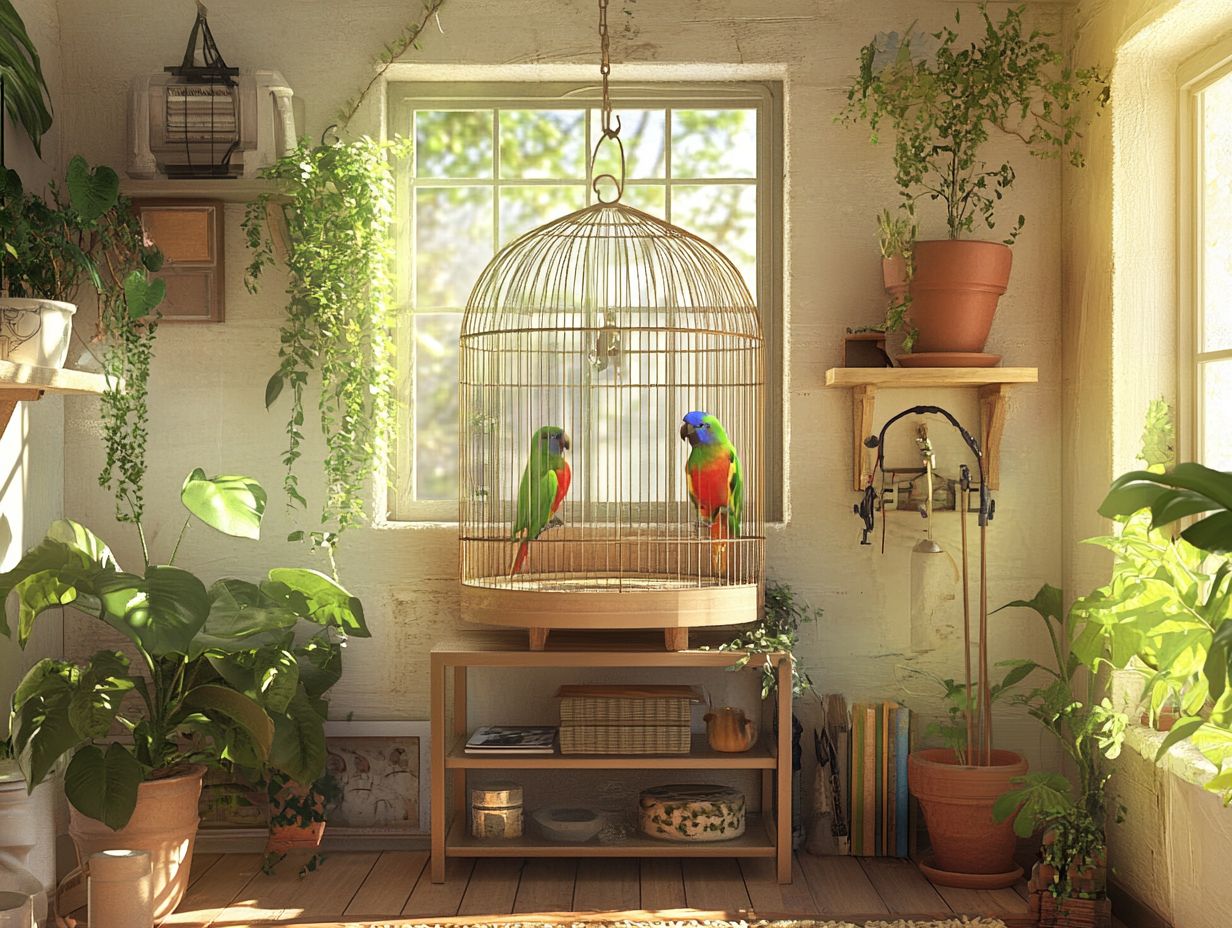
- Identify and remove potential hazards for birds in the household, such as toxic substances and dangers like open windows or doors.
- Be aware of warning signs of illness in birds, including changes in behavior and physical indicators, and seek veterinary care if necessary.
- Create a safe environment for birds by taking preventive measures, handling them properly, and using safe household products. Know how to administer first aid in case of emergencies.
Common Household Hazards for Birds
Common household hazards present significant risks to pet birds, potentially resulting in serious health issues or even fatalities. Many everyday items found in your home can be hazardous for these delicate creatures.
Toxic foods and chemical cleaning products pose dangers, along with items that emit Teflon fumes when heated. Dangers also include tempting electrical cords, which can lead to injury if chewed on. Don’t forget about carbon monoxide a silent threat that can impact both humans and your feathered friends.
Toxic Substances and Other Dangers
Toxic substances lurking in and around your home can pose serious dangers to your feathered companions. These can lead to respiratory issues and other health problems.
Everyday household items like Teflon cookware and aerosol sprays can release lethal fumes. Many cleaning products contain chemicals that are harmful if ingested or inhaled.
Certain scented candles and air fresheners release chemicals found in some air fresheners and candles, which can irritate a bird’s sensitive respiratory system. Even seemingly harmless plants, such as philodendron and pothos, can become toxic if your avian friends decide to nibble on their leaves.
As a bird owner, you must recognize these hazards to keep your feathered friends safe! Consider choosing bird-safe cleaning alternatives, like vinegar and baking soda, which are less likely to pose a threat. Stay vigilant for signs of poisoning or respiratory distress in your birds look for coughing, wheezing, lethargy, and changes in vocalization, all of which are red flags. Keeping a watchful eye is key to ensuring their health and well-being.
Identifying Signs of Illness in Birds
Recognizing signs of illness in your birds is essential for safeguarding their health. Early detection often holds the key to effective treatment.
You might notice a range of behavioral and physical clues when your feathered friends are feeling unwell. Changes in behavior, such as lethargy or a decreased appetite, can hint at underlying health problems.
Physical signs like ruffled feathers, labored breathing, or alterations in their droppings should prompt you to get immediate help from an avian veterinarian, a vet who specializes in birds.
Behavioral and Physical Indicators
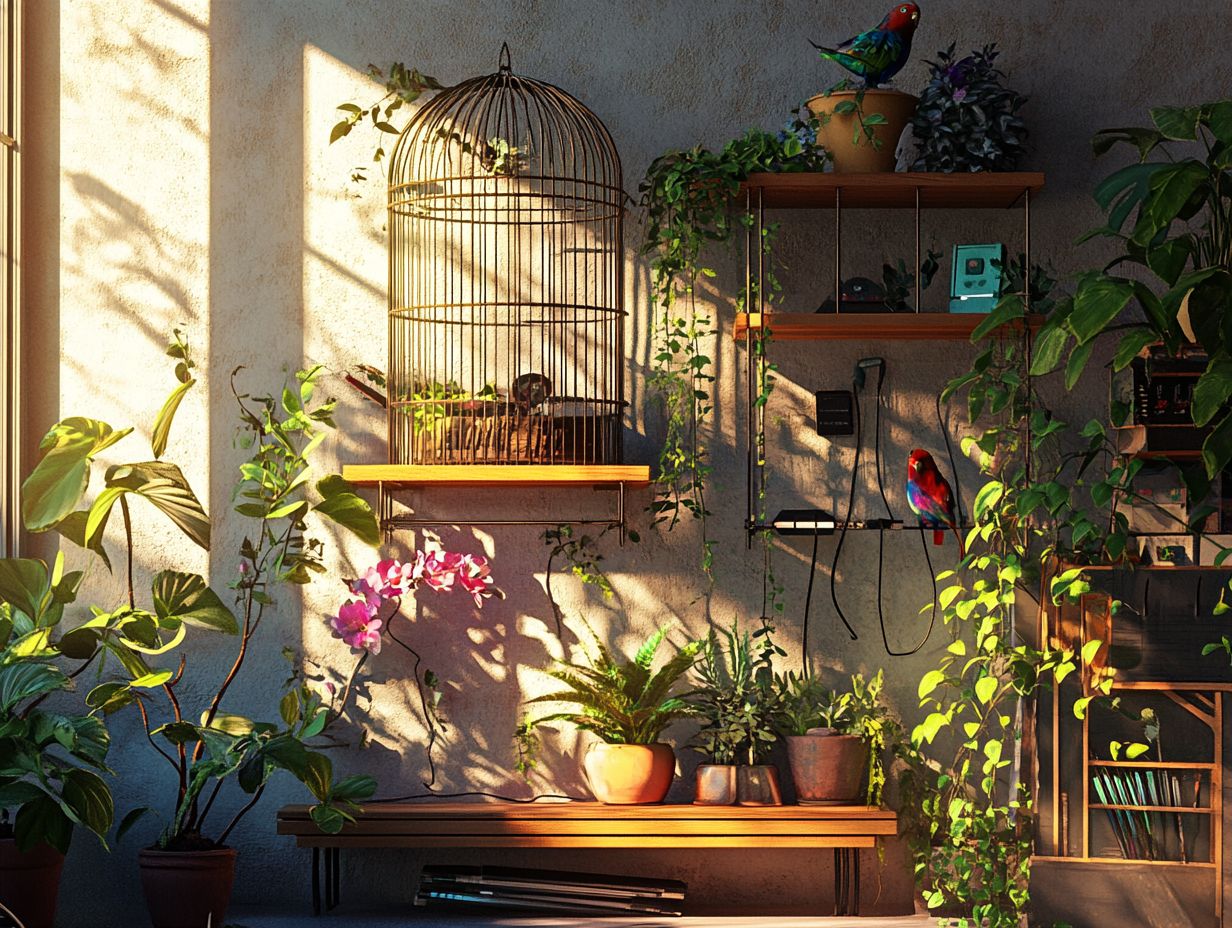
Behavioral and physical indicators are crucial cues that help you, as a pet bird owner, detect underlying health issues. If you notice changes in behavior such as increased aggression or a decline in social interaction these may signal distress.
Physical signs like feather plucking, weight loss, or abnormal droppings could indicate serious health concerns. Regularly watching your bird is crucial for their health! Early detection can significantly enhance the chances of successful treatment.
When you notice notable changes, such as a sudden shift in eating habits or sleeping patterns, prompt action is necessary. Keeping an eye on daily activities and tracking food and water intake can provide invaluable insights into your bird s health.
If symptoms persist, consulting with a bird veterinarian is vital. They can offer tailored care and effectively address potential issues, ensuring your bird’s well-being and longevity.
Creating a Safe Environment for Birds
Creating a safe environment for your birds is essential for being a responsible pet owner. It directly contributes to their well-being and happiness.
A bird-safe home significantly reduces potential hazards and can be achieved with straightforward improvements. Consider investing in stainless steel cages, securing electrical cords, and keeping toxic plants and foods well out of their reach.
Your thoughtful efforts will ensure a secure haven for your feathered companions.
Preventive Measures and Proper Handling
Preventive measures and proper handling are paramount for ensuring your bird’s safety and minimizing exposure to household dangers. As a bird owner, you must be aware of various hazards lurking in your home, such as toxic plants, cleaning products, and potential choking hazards posed by toys or everyday items.
Beyond simply identifying these risks, it s crucial for families to participate in training sessions focused on effective bird handling techniques and safety protocols. Teaching everyone, particularly children, how to approach and interact with their feathered companions can significantly reduce the chance of accidents.
Regular check-ups with a bird veterinarian are equally vital, as these visits help monitor your pet bird’s health. They also provide opportunities for vaccinations or tailored advice addressing specific needs. By cultivating a safe environment and adhering to these precautions, you can ensure your beloved pet thrives in a secure and loving home.
Safe Household Products for Birds
Identifying safe household products for birds is vital for creating a healthy environment and minimizing exposure to harmful toxins. Many everyday cleaning products and household items contain chemicals that can adversely affect avian health. It’s essential to explore safer alternatives.
By opting for bird-safe products, you not only safeguard your pet birds’ well-being but also foster a healthier atmosphere within your home.
Alternatives to Hazardous Products
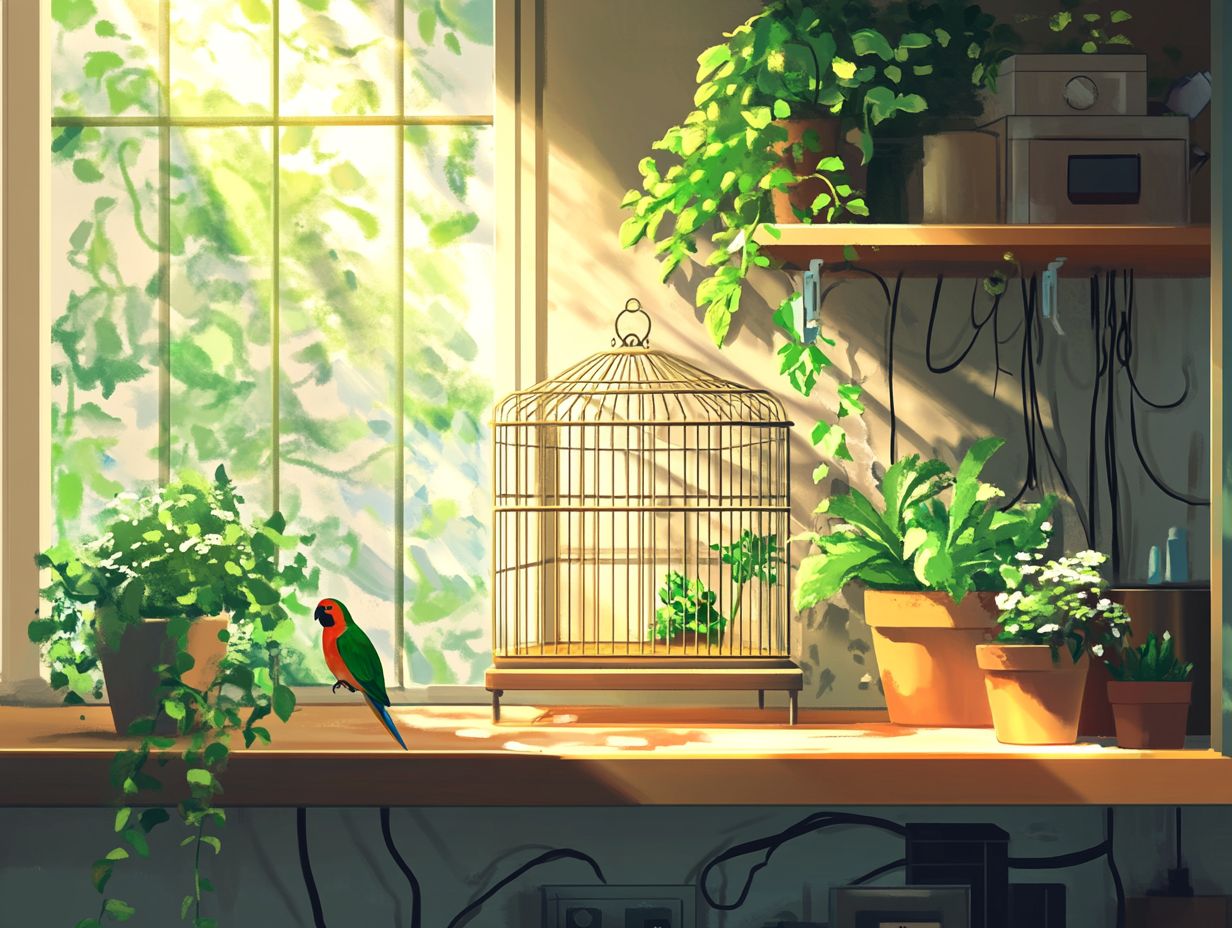
Choosing alternatives to hazardous products is essential for protecting your pet birds while minimizing their exposure to harmful chemicals. By selecting bird-safe cleaning products and materials, you can create a safer living environment for your feathered companions.
For example, opting for vinegar and baking soda instead of traditional cleaning supplies allows you to clean surfaces effectively without subjecting your birds to toxic fumes. Diluting castile soap with water provides a gentle yet effective cleaner for various surfaces.
You can also whip up a natural air freshener by mixing essential oils like lavender or lemon with water, which helps eliminate odors and is safe for your avian friends.
Using untreated, natural wood for perches and toys enhances bird safety. Many manufactured items may come coated with harmful substances. The beauty of these non-toxic options is that they not only create a healthier habitat for your birds but also promote a more sustainable lifestyle for you, ultimately reducing your environmental footprint.
Emergency Care for Birds
Emergency care can save a bird s life! Equipping yourself with bird first aid knowledge enables you to respond swiftly to health crises.
Recognizing when to consult a veterinarian who specializes in birds is crucial for their well-being.
First Aid and When to Seek Veterinary Help
First aid for birds requires specific techniques. Knowing how to stabilize their condition until professional help arrives is essential.
Look for signs of distress or injury. It’s vital to act quickly in emergencies like choking.
Stay calm and gently tilt the bird forward. Soft taps on its back can help dislodge the obstruction.
If you see a broken wing or leg, keep the bird still. Use a soft cloth or splint to immobilize the injured area.
Be alert for signs of shock, such as puffed feathers or rapid breathing. Handle the bird gently and keep it warm and quiet while arranging prompt veterinary attention.
Frequently Asked Questions
What are some common household hazards that can harm birds?
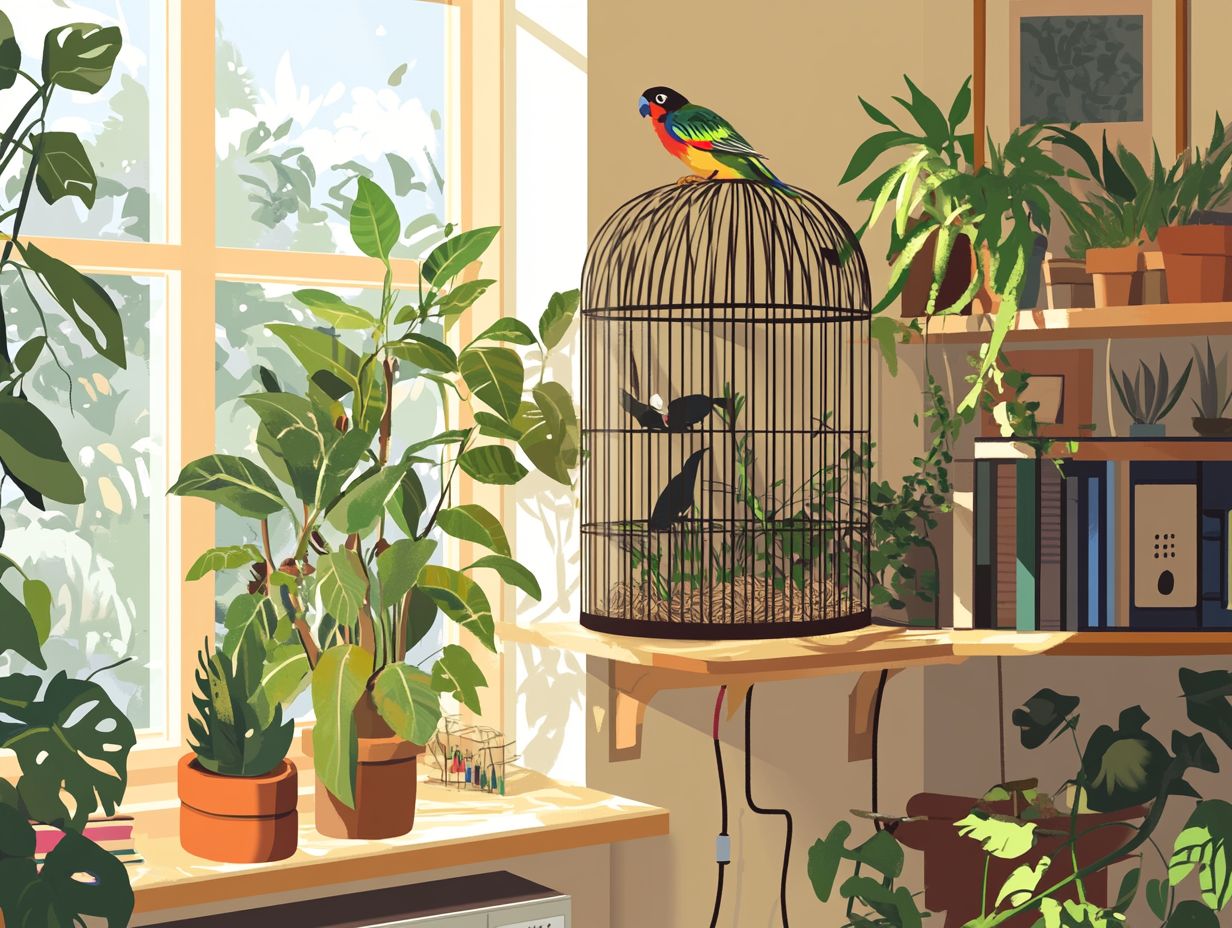
Toxic plants, chemicals, open windows, and unsecured electrical cords can harm birds.
How can I prevent my bird from ingesting toxic plants?
Research and identify toxic plants in your home. Remove them from areas your bird can access.
Purchase safe and bird-friendly plants to have in your home.
What types of chemicals should I be careful of around my bird?
Birds are sensitive to fumes from cleaning products, pesticides, and scented candles. Use natural and bird-safe products in your home.
How do I ensure my bird’s safety around open windows?
Always use screens on your windows to prevent your bird from flying out. Keep windows closed when your bird is out of its cage if screens are not present.
What precautions should I take with my bird around electrical cords?
Secure all electrical cords and keep them out of reach. Use cord covers to prevent your bird from chewing on them.
What are some other potential hazards to be aware of?
Small objects that can be swallowed, non-stick cookware, and drafts from air vents can be hazardous. Always supervise your bird and be cautious of potential dangers in your home.

